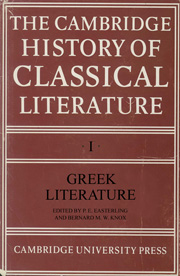Book contents
- Frontmatter
- 1 Books and readers in the Greek world
- 2 Homer
- 3 Hesiod
- 4 The epic tradition after Homer and Hesiod
- 5 Elegy and iambus
- 6 Archaic choral lyric
- 7 Monody
- 8 Choral lyric in the fifth century
- 9 Early Greek philosophy
- 10 Tragedy
- 11 The satyr play
- 12 Comedy
- 13 Historiography
- 14 Sophists and physicians of the Greek enlightenment
- 15 Plato and the Socratic work of Xenophon
- 16 Oratory
- 17 Aristotle
- 18 Hellenistic poetry
- 19 Post-Aristotelian philosophy
- 20 The literature of the Empire
- 21 Epilogue
- Appendix of authors and works
- Metrical appendix
- Works Cited in the Text
- References
12 - Comedy
Published online by Cambridge University Press: 28 March 2008
- Frontmatter
- 1 Books and readers in the Greek world
- 2 Homer
- 3 Hesiod
- 4 The epic tradition after Homer and Hesiod
- 5 Elegy and iambus
- 6 Archaic choral lyric
- 7 Monody
- 8 Choral lyric in the fifth century
- 9 Early Greek philosophy
- 10 Tragedy
- 11 The satyr play
- 12 Comedy
- 13 Historiography
- 14 Sophists and physicians of the Greek enlightenment
- 15 Plato and the Socratic work of Xenophon
- 16 Oratory
- 17 Aristotle
- 18 Hellenistic poetry
- 19 Post-Aristotelian philosophy
- 20 The literature of the Empire
- 21 Epilogue
- Appendix of authors and works
- Metrical appendix
- Works Cited in the Text
- References
Summary
Introduction
‘It was produced in the archonship of Euthynus at the Lenaea by Callistratus. Result, first; second, Cratinus with Kheimazomenoi (not preserved); third, Eupolis with Noumeniai.’ So runs the record for our earliest surviving comedy, the Acharnians of Aristophanes, and it refers to an occasion in the year we call 425 B.C. At that time Aristophanes and Eupolis were near the beginning of their careers, young men in their twenties; Cratinus had won his first victory at the festivals some thirty years before, and Aristophanes, on the way up, could portray his distinguished rival as a figure from literary history, now a neglected old has-been with a drink problem. It happens that the first date in that literary history is some thirty years earlier still, in a year reckoned to be 486 B.C., when a competition for comedies was instituted at Athens as an official event at the Dionysia, and the winner was one Chionides, a man remembered by posterity for little else.
If Chionides and Magnes are the names to mention from the first generation of writers of Athenian Old Comedy, as they are for Aristotle in the Poetics (1448a34), then Cratinus and Crates represent the second generation; Eupolis and Aristophanes are of the third and last. What we know about Old Comedy still depends, in overwhelmingly large measure, on the selection of eleven plays by Aristophanes which survive in medieval copies together with an inheritance of interpretative commentary, a corpus of marginal scholia which has offered a perennial invitation to scholarly interest and may have been of decisive importance in keeping the text alive through times when so much other literature was lost.
- Type
- Chapter
- Information
- The Cambridge History of Classical Literature , pp. 355 - 425Publisher: Cambridge University PressPrint publication year: 1985
References
- 5
- Cited by

